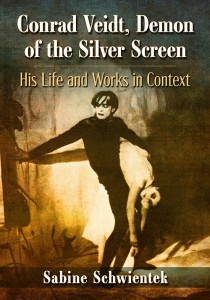On a related topic:
The Use and Abuse of Cinema (2015)
German Legacies from the Weimar Era to the Present
Subject: History of Cinema
The Haunted Screen (2008)
Expressionism in the German Cinema and the Influence of Max Reinhardt
The Gorgon's Gaze (1991)
German Cinema, Expressionism, and the Image of Horror
by Paul Coates, William Rothman and Dudley Andrew
Conrad Veidt, Demon of the Silver Screen
His Life and Works in Context


Average rating: ![]()
| 0 | rating | |
| 0 | rating | |
| 0 | rating | |
| 0 | rating |
Your rating: -
Book Presentation:
This book depicts the life of Conrad Veidt (1893–1943), the defining German actor of Expressionist cinema in the 1920s. His legendary performance in Das Cabinet des Dr. Caligari (1919/20) earned him the epithet “Demon of the Screen” and made Veidt an international star. To this day, Veidt is considered an icon of early horror film. He showed his acting range in more than a hundred films, among them masterpieces such as The Indian Tomb (1921), Orlac’s Hands (1924), The Man Who Laughs (1928), The Thief of Bagdad (1940), and Casablanca (1942).
Conrad Veidt used his acting career to become socially and politically involved, starting with the film Anders als die Anderen, the first film to advocate homosexual rights, in 1919. After the Nazis came to power, he left Germany to protest anti–Semitism and Nazi rule. Along with his biography, this book provides insights into the development of filmmaking from its beginnings through the 1940s, an epoch of cinematic art marked by technical innovations like sound and color film and by world-shaking events, including two world wars.
About the Author:
Sabine Schwientek is a communication designer, art historian, and a freelance artist and author. She lives in the Bergisches Land region of North Rhine-Westphalia, Germany.
Press Reviews:
• "Splendid… Here, in the English translation of Dämon der Leinwand, Dr. Schwientek guides those many legions of Veidt’s fans and followers not fließend Deutsch (fluent in German) through the actor’s tragically brief life, his fascinating career, and the development of the cinema into a fascinating art form."—John T. Soister, author of Conrad Veidt on Screen
• "Conrad Veidt studies benefit tremendously from Sabine Schwientek’s wonderful book on the film actor whose work included everything from The Cabinet of Dr. Caligari (1920) to Casablanca (1943). Highly recommended."—Gary D. Rhodes, Ph.D., author of The Birth of the American Horror Film
• "I first liked Conrad Veidt the actor. When I was growing up, most of his English-language films were shown regularly on TV…But when I learned of his humanitarian efforts before and during WWII, I became a fan of Conrad Veidt the man. Conrad Veidt deserves to be remembered for both reasons, his great acting and his great humanitarian activism, and Sabine’s book captures both the actor and the man wonderfully."—Barbara Peterson, president, Conrad Veidt Society
• "Conrad Veidt was one of the great actors of the German screen and a courageous man as well so it’s shocking so little has been written about him. Sabine Schwientek here does much to correct this injustice with a very detailed biography of Veidt and a close examination of his work in film and on stage. Though his German period gets a heavy emphasis, his time in England and later the United States is also covered thoroughly. Fans of horror are apt to emphasize Veidt’s appearance in Caligari while lovers of vintage film remember him mainly for his Nazi major in Casablanca but Schwientek outlines in her book how much more there was to his extraordinary career."—Henry Nicolella, author of Frank Wisbar, the Director of Ferryman Maria, from Germany to America and Back
• "A comprehensive account of a giant of German cinema in the 1920s and 30s who resisted the rise of Nazism and in 1935 was forced into exile in Britain and the United States where he continued to struggle against racism, antisemitism, and homophobia. … Conrad Veidt’s sympathy for the marginalized homosexual and his pioneering resistance to the rising tide of antisemitism in Jew Süß, a sympathetic portrayal of a Jewish victim of persecution, provide Schwientek with an opportunity to describe and define the social and political currents that shaped Veidt’s career. In our day, a time of global environmental, social, and political crisis, a German voice of resistance to Nazi racism and authoritarianism is extremely relevant. Speaking uncomfortable truth to your own people on behalf of the marginalized, despised, and persecuted is the essence of a true nobility that resides not in blood but in courage and compassion."—Charles McCollester, past president of the Pennsylvania Labor History Society and the Battle of Homestead Foundation
See the publisher website: McFarland & Co
See the complete filmography of Conrad Veidt on the website: IMDB ...